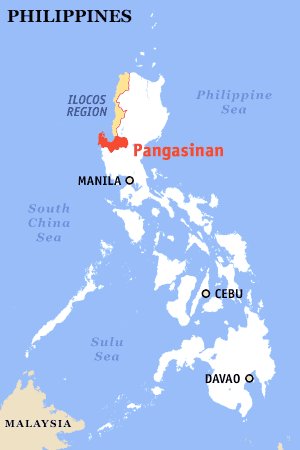Pangasinan
|
|
Pangasinan is a province of the Philippines located in the Ilocos Region in Luzon. Its capital is Lingayen and borders La Union and Benguet to the north, Nueva Vizcaya and Nueva Ecija to the east, and Zambales and Tarlac to the south. To the west of Pangasinan is the South China Sea and the province encloses the Lingayen Gulf.
Ph_seal_pangasinan.png
Image:Ph_seal_pangasinan.png
2000 census—2,434,086 (3rd largest)
Density—453 per km² (8th highest)
Highly urbanized cities—0
Component cities—4
Municipalities—44
Barangays—1,364
Congressional districts—6

Pangasinan is famous for the Hundred Islands National Park. This is a marine park located off the coast of Alaminos City in the Lingayen Gulf and is composed of some 123 islands, most of which are quite small and uninhabited.
| Contents |
People and Culture
The province has roughly equal populations of Pangasinenses and Ilocanos.
Economy
Geography
Political
Pangasinan is subdivided into 44 municipalities and 4 cities.
Cities
Municipalities
Physical
History
Provincial Names. The term Pangasinan literally means “place where salt is made” in Pangasinense or Ilocano, the two dominant languages in the province. The name referred to the ancient and indigenous salt-making industry of Pangasinan. Salt was harvested from the sea through the process of evaporation; sea water is dried in the sun, leaving salt behind. Alternately, boiling sea water through the use of the 'tong tong' is predominantly done in the island town of Anda, whose language is Bolinao, a dialect similar to that of Sambal from the province of Zambales. The province is also famous for its salted fish and fish sauces (bagoong).
Another name for the province was Caboloan, though this is no longer used very often today. The term came from boló, which is a type of bamboo that grows in certain places in the province. This bamboo was used in making domestic items like baskets and bilaos (trays).
Prior to the arrival of the Spanish colonizers, Pangasinan was used to refer to the coastal salt-making areas while Caboloan referred to the interior areas where boló grew abundant.
Arrival of the Spanish. Martin de Goiti first came to the area coming north from Pampanga, in 1571. Then, a year later, the intrepid explorer Juan de Salcedo travelled by sea from the south, entering Lingayen Gulf and landing at the mouth of the Agno River. In 1580, Gonzalo Ronquillo de Peñaloza, the Spanish Governor-General of the Philippines made Pangasinan into an Alcadia Mayor. Pangasinan was then made into a province in 1611, comprising also the territories of Zambales and some areas of La Union and Tarlac. Lingayen was made the capital of the new province (and still is to this day).
...
World War II. Lingayen Gulf was one of the strategic places during the Second World War. Japanese forces under Gen. Masaharu Homma landed on Pangasinan in December 1941, a few days after the attack on Pearl Harbor and started the Japanese occupation of the country. In 1945, American troops landed here and started to free Luzon from the Japanese.
Tourist Attractions
Hundred Islands
The Hundred Islands National Park, off the coast of Brgy. Lucap in Alaminos City is composed of some 123 islands in the Lingayen Gulf. Most of the islands are quite small and appear to be rocky outcrops with lush vegetation on top.
Manaoag Shrine
The Shrine of Our Lady of Manaoag is famous throughout the country for its supposedly miraculous powers. Catholic devotees frequent the shrine especially on the feast days on the first of October and the 18th day after Easter Sunday.
External Links
- Official Website of the Provincial Government of Pangasinan
- Pangasinan: Preservation and Revitalization of the Pangasinan Language (Pangasinense) and Literature
| Regions and Provinces of Luzon | |
| Ilocos Region: | Ilocos Norte | Ilocos Sur | La Union | Pangasinan |
| Cagayan Valley: | Batanes | Cagayan | Isabela | Nueva Vizcaya | Quirino |
| Central Luzon: | Aurora | Bataan | Bulacan | Nueva Ecija | Pampanga | Tarlac | Zambales |
| CALABARZON: | Batangas | Cavite | Laguna | Quezon | Rizal |
| MIMAROPA: | Marinduque | Occidental Mindoro | Oriental Mindoro | Palawan | Romblon |
| Bicol Region: | Albay | Camarines Norte | Camarines Sur | Catanduanes | Masbate | Sorsogon |
| Cordillera Adm. Region: | Abra | Apayao | Benguet | Ifugao | Kalinga | Mountain Province |
| Metro Manila: | No provinces |
